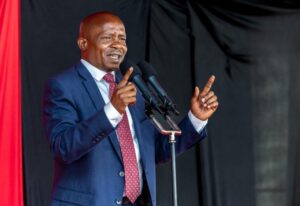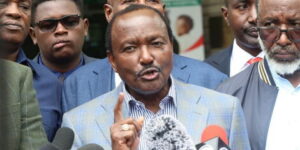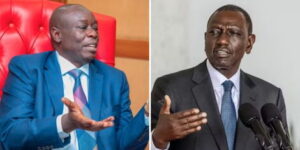| Mwau Dorothy |
In a recent statement, Deputy President Rigathi Gachagua addressed allegations of tribalism
directed at him, emphasizing his commitment to national unity and urging his critics to evaluate
his actions rather than making unfounded claims.

Speaking in Mt. Kenya, the Deputy President
expressed frustration over being accused of promoting tribal divisions.
Gachagua stated, “I am not a tribalist. Those who are talking about me in Western and Rift
Valley should come and talk here in Mt. Kenya.” His remarks aimed to counter the narrative that
he favors certain regions over others, a sentiment that has been circulating in political discourse.
The Deputy President’s comments come when Kenya’s political landscape is fraught with
accusations of tribal favoritism, often used as a tool to gain political leverage. Gachagua’s call for
dialogue and transparency reflects his desire to dispel these allegations and focus on the broader
agenda of national development and unity.
Gachagua highlighted his efforts in various regions across the country, underscoring his
commitment to equitable development. He pointed to numerous projects initiated under his
leadership that benefit diverse communities, aiming to demonstrate that his policies are inclusive
and not biased towards any particular tribe or region.
In his speech, the Deputy President called for an end to divisive politics, urging leaders to focus
on policies that unite rather than divide. He emphasized that Kenya’s strength lies in its diversity
and that leveraging this diversity for the common good should be the priority of every leader.
He also challenged his detractors to present evidence of any tribal favoritism in his policies or
actions. Gachagua asserted that his track record speaks for itself and that he has always
prioritized the welfare of all Kenyans, irrespective of their tribal affiliations.
The Deputy President’s comments were met with mixed reactions. Some leaders from Mt. Kenya
lauded his stance, expressing support for his call for unity and condemning the tribal accusations
as baseless. However, critics remain skeptical, arguing that actions speak louder than words and
calling for more concrete steps toward national cohesion.
Gachagua’s speech also touched on historical injustices and the need for reconciliation. He
acknowledged that while tribalism has been a persistent issue in Kenya’s political history, there is
an urgent need to move past it and work towards a future where all Kenyans feel represented and
valued.
In this context, he praised President William Ruto’s administration for its efforts to promote
inclusivity and national unity. Gachagua reiterated his support for the President’s vision and
assured that their administration would continue implementing policies bridging ethnic divides.
The Deputy President concluded his address by appealing to the youth to reject tribalism and
embrace a united Kenya. He stressed the importance of education and civic engagement in
fostering a sense of national identity that transcends tribal lines.
Gachagua’s call for dialogue and unity is timely, considering the upcoming electoral cycle, which
often exacerbates ethnic tensions. His message aims to set a tone of inclusivity and cooperation
among Kenya’s political leaders.
As the country gears up for future elections, the Deputy President’s remarks serve as a reminder
of the need for leaders to prioritize national unity and development over narrow tribal interests.
His speech underscores the ongoing struggle to eradicate tribalism from Kenya’s political
landscape and the importance of sustained efforts towards achieving this goal.
Overall, Gachagua’s statement reflects a broader commitment within the Kenyan leadership to
address the deep-seated issue of tribalism and foster a more inclusive and cohesive society. The
coming months will be crucial in determining how these efforts translate into concrete actions
and policies.






